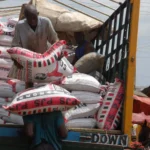Women make up nearly 50 percent of Nigeria’s population, and yet they remain largely underrepresented in the country’s governance.
In fact, with only 6.42 percent of women representation in the country’s current National Assembly, Nigeria has one of the lowest rates of women representation in parliament.
The issue of participation of women in politics is of such importance that the United Nations (UN) identified gender equality as a mainstay of its Sustainable Development Goals (SDGs).
‘Achieve gender equality and empower all women and girls’, the SDG five reads.
With the goal to increase the level of women’s participation in politics, the UN, through concerted efforts, has been encouraging countries to reserve at least 30 percent of seats in their national parliaments for women.
While Africa’s most populous country is far from achieving the UN goal, countries like Rwanda (61.25 percent), South Africa (46.35 percent), Senegal (41.82 percent) and Ethiopia (38.76 percent) have shown good examples of increasing the level of women’s participation in politics.
Nigeria’s National Gender Policy (NGP) even recommends at least 35 percent of affirmative action, as the policy seeks the inclusive representation of women with regard to elective and appointive public service positions.
However, adherence to the NGP leaves a lot to be desired; with a gender equality bill seeking legislative framework to empower women for increased participation in politics suffering setbacks since 2016.
The Knowledge, Evidence, Learning for Development (K4D) identified corrupt and patronage-based political system, violence at elections, including against women candidates, as challenges that impede youth and women’s participation in Nigerian politics.
Every election circle brings to the forefront the inequality Nigerian women are forced to endure in the political space, with Yiaga Africa revealing more worrying findings.
Yiaga Africa’s Factsheet on Youth and Women Candidacy in the 2022 FCT Area Council Elections shows that women representation in the forthcoming polls is abysmally low, with female candidacy at 8.87 percent.
‘A gender analysis of youth candidates in the councillorship election for the 2022 FCT local council elections reveals that 91.1 [percent] of the youth candidates are male. This figure is indicative of the very low representation of the female gender in the elections. Only 8.87 [percent] of youth candidates for the councillorship election are female’, the Yiaga Africa report read.
With a view to achieving the UN’s SDG five, the Gender Centre for Empowering Development (GenCED) West Africa, with support from the National Endowment for Democracy (NED), has been building the capacity of young women politicians to run for and win elections.
Through its Young Women’s Political Leadership School (YWPLS) training, GenCED has provided participants with relevant knowledge and tools to aid them in their political life as change makers.
The fourth season of the YWPLS has commenced with 18 young women from different political parties.
It is understood that six of the participants in the Cohort 004 are candidates of their various political parties for the 2022 FCT Area Council elections.
One of the participants, Juliet Isi Ikhayere, a councillorship candidate for Kubwa Ward, Bwari Area Council, under the African Democratic Congress (ADC), said she participated in the YWPLS training because she was ‘100 percent in support of women participation in politics’.
She added, ‘Because it (women participation in politics) provides the platform for women to contribute her quota to the development of the society’.
Another participant, Horsefall Chikaba Mina, who is running for the chairmanship position of the Abuja Municipal Area Council (AMAC), under the National Rescue Movement (NRM), said that YWPLS was ‘setting the pace’ for gender equality in politics.
‘This is the era for increased female participation in governance so that the country can change course from the downward trajectory to a better future and I believe the YWPLS is setting the pace’, she said.
What has GenCED achieved with the YWPLS training?
‘A total of 26 fellows amongst the 40 fellows of the YWPLS won their various primary elections and contested the 2019 Nigeria’s general election. Sadly, none of the fellows were able to win in the general election’, the Nigeria Representative of GenCED West Africa, Adaje Sunday, told Development Diaries.
‘Nevertheless, two of them are presently serving as special advisors to their governors – Zamfara and Kaduna states – and [one] with Abuja Municipal Area Council (AMAC) chairman’.
Sunday, who is also the Executive Director of Sikika Afrika Initiative, also said that GenCED West Africa provided technical support and strong guidance to all the participants/fellows with their political activities post-YWPLS training.
‘The present Speaker of Nigeria Youth Parliament, Azeezat Yishawu, is a fellow of Young Women Political Leadership School 003 cohort’, he said, adding that four members of the parliament also passed through the YWPLS training.
Similarly, Yiaga Africa launched the ‘Run To Win’ campaign in 2021, with the ultimate goal of increasing the participation of competent young women and men in electioneering in Nigeria.
The ElectHer movement, a progressive women’s political advancement organisation in Nigeria, also launched its Agenda35 campaign in March 2021, unveiling a U.S.$10million campaign fund to support 35 women to run for offices in 2023.
Women lawmakers have also introduced another gender equality bill as they seek to create 111 additional special seats for women in the National Assembly.
The civil society and other players in the development sector are also expected to sustain the efforts aimed at ensuring that Nigeria achieves the SDG five.
Photo source: Sikika Afrika Initiative




